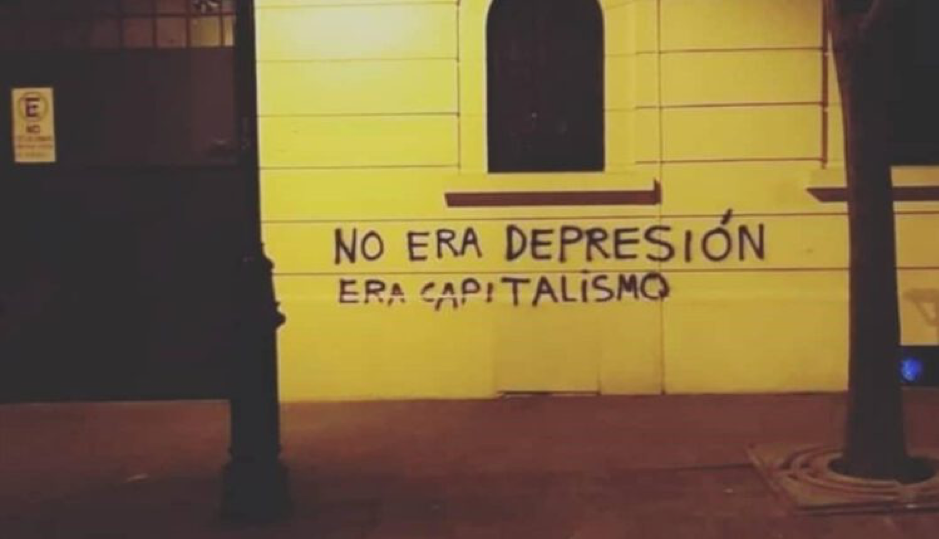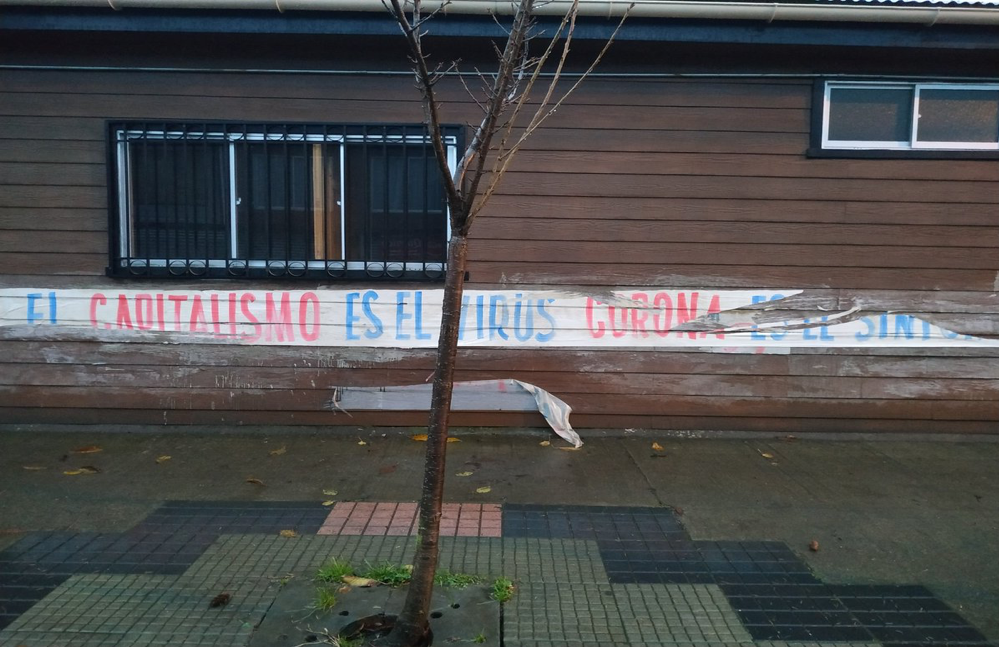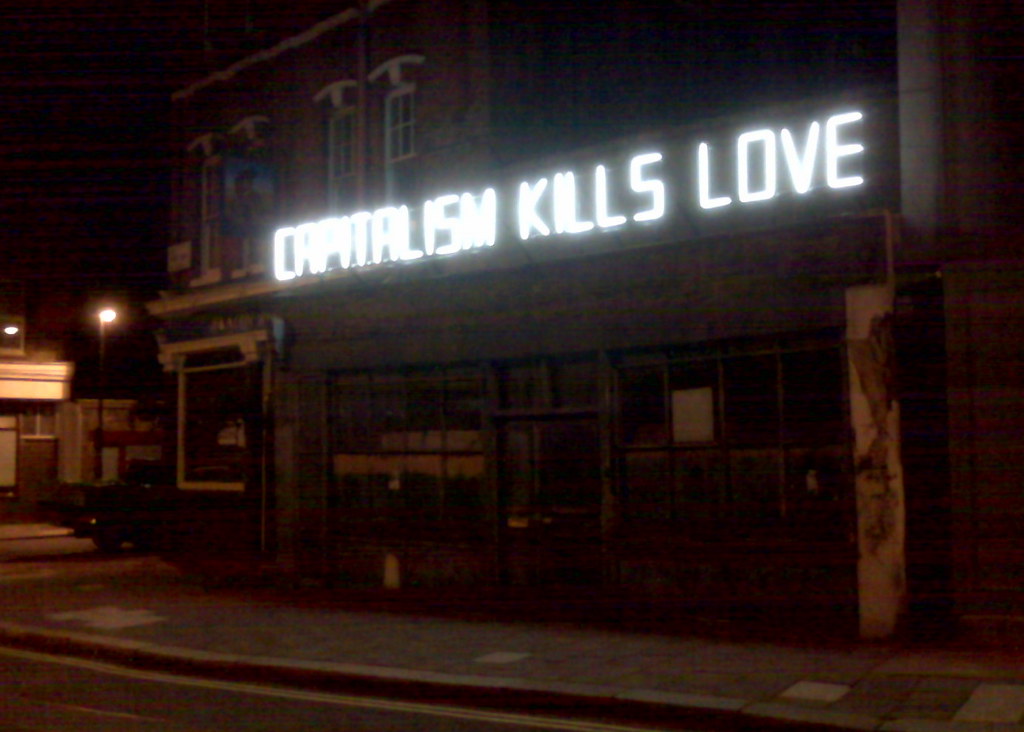This essay is a part of the COVID-19 dossier, edited by Arne De Boever.
by Mikkel Krause Frantzen
1/ The future is already lost, the loss is just unevenly distributed. This altered version of sci-fi author William Gibson’s famous one-liner captures our age nicely: there is, on the one hand, the permeating sense that the future has no future, that the future has slipped away before our eyes. On the other, this doesn’t mean ‘we’ are all in the same proverbial boat, that ‘we’ are suffering in the same way. It is also important to realize that this loss of futurity is not an abstract loss. When you are in debt and have pawned away your future, more precisely your future labor, in order to pay back a debt that can never be paid, it is not abstract. When you live in the Arctic and the ice is melting due to global warming and you can foresee that you cannot sustain your way of life, or you live in Australia and endless draught has made it impossible keep living on the land that you and your family have lived on for generations, it is not abstract. The loss is concrete and it has economic and ecological implications. To quote from Joshua Clover’s poetry collection Red Epic, “because reasons”: because capitalism and its genocidal and ecocidal machine.
2/ It wasn’t depression, it was capitalism. As I have written elsewhere (in the book Going Nowhere, Slow and also in The Los Angeles Review of Books), the loss of futurity is one of the symptom(s) of depression, if not its primary symptom. Since the 1970s, depression has gradually become the paradigmatic psychopathology of capitalist societies. Alan Horwitz has detailed how by 1975, the 18 million diagnoses of depression had surpassed the 13 million diagnoses of anxiety, and in 1980 the third edition of Diagnostic and Statistical Manual of Mental Disorders (DSM) saw the light of day, a pivotal event within the field of psychiatry: “Although biological psychiatry and its central vehicle of depression were gaining ground during the 1970s, the implementation of the third edition of the Diagnostic and Statistical Manual (DSM-III), which the APA issued in 1980, was the central turning point leading to the transition from anxiety to depression.” That the history and rise of depression runs parallel with the history and rise of neoliberalism should cause us no surprise. When no such thing as society exists, when all forms of collectivity have been utterly destroyed, all there is left is the individual. If you are depressed, it is your own fault. Like in the diagnostic manuals, no context is needed. If you feel like shit, you alone are to blame. It is your own personal problem and responsibility.

3/ Capitalism kills love, but it kills more than that. There is an artwork by the artist duo Claire Fontaine, whose work often engages the relation between depression and the political economy: it’s a neon sign that says “Capitalism kills love.” But capitalism kills more than that. Capitalism, some times in the guise of neoliberal austerity measures, forces people to kill themselves. The examples are legion: Dimitris Christoulas in Greece, who put a gun to his head in front of the Greek parliament, declaring “I am not committing suicide, they are killing me”; Jerome Rodgers in England, who died by suicide aged twenty after two unpaid £65 fines spiraled to over £1000; Daniel Desnoyers in the US, who “committed suicide after he lost his insurance and access to his psychiatric medication because he was $20 short on the monthly premium.” Or a 22-year-old-student in Lyon, France, who set himself on fire in front of a university restaurant due to financial difficulties and a desperate, precarious situation. Quickly the hashtag “#laprécaritétue” spread: Insecurity, precarity, kills. Let’s also not forget the waves of suicides at the Foxconn factory in China around 2010, with one worker, Xu (not to be confused with the poet Xu Lizhi who killed himself at this exact place in 2013) telling The Guardian some years later: “It wouldn’t be Foxconn without people dying […] Every year people kill themselves. They take it as a normal thing.” This is capitalist normality: Suicide, death. You die before you should have, it’s a normal thing. All of this to say that the current crisis, or crises, is also a mental health crisis. Across the globe people (students, workers, the unemployed) seem to be getting more and more unhappy, desperate and depressed. It is a common, yet uneven condition. Some tragic cases (like those just described) make it into the news; many others do not.
4/ What COVID-19 intensifies is an already generalized condition. And then COVID-19 happened. At the time of this writing, the virus has led to more than half a million dead across the globe. Since the outbreak of the pandemic 40 million Americans have lost their jobs, supply chains have broken down, consumption has plummeted, oil prices have been negative and the global levels of debt, already sky-high, have reached stratospheric heights. On March 16, when the VIX opened at 57,83 and closed at 82,69, the Dow Jones Index fell nearly 3,000 points, “the worst trading day in percentage terms since the ‘Black Monday’ crash of 1987 when the Dow got a 22 percent haircut.” And then, magically and absurdly, the markets recovered: In the beginning of July, The Economist reported that “American stock markets recorded their best quarter in at least two decades. From April to June the S&P i500 and Dow Jones Industrial Average rose by around 25%, and the Nasdaq by over a third.” Once again, the Fed came to the rescue, this time even keeping the junk bond-market afloat, while the average American was left to drown in a sea of debt, joblessness and little to no health care. Once again, the final reckoning was postponed and another veil was cast over the stark economic reality. This is the current predicament, a situation which COVID-19 has intensified, but in no way initiated. It is a crisis that is intimately and inherently connected not only to the economic crisis, but also and above all to the ongoing ecological one: the loss of biodiversity, deforestation, the food industry, agricultural capitalism, the destruction of ecosystems and wildlife habitats—all of these events (and many more) are contributing factors in the outburst and dispersion of SARS-CoV-2. “Forget the butterfly effect,” Adam Tooze argues: “this is the bat effect – our stranglehold on nature has unleashed the coronavirus outbreak. And the pandemic is forcing us to rethink how to run our networked world.” As is the case with the climate crisis, the corona crisis is no natural disaster. It is yet another example of what Marx and Engels, in The Communist Manifesto, referred to as “the sorcerer, who is no longer able to control the powers of the nether world whom he has called up by his spells.” Yet another example of nature getting even. And ‘we’, the humans living in and through the crisis, have to ask the question that Mike Davis—who wrote about the avian flu in The Monster at our Door (2005)—articulated lately: has capitalist globalization become biologically unsustainable?
5/ Zoom is shit. Meanwhile (and as several texts included in this dossier have already described), the lockdown continued, university teaching took place online, and students were forced to sit at home, each in front of their own screen, isolated and alienated. Of course, many students around the world were already indebted and feeling lost, and without any future whatsoever. A futureless and fucked-up generation indeed. In Fall 2019, a Danish report was published, documenting that approximately 10% of all students in the Faculty of Humanities, University of Copenhagen, are struggling with mental health issues. This number only corroborates a general tendency in Danish society and the 18,4% increase in diagnoses of depression during the last decade. Other data even suggest that almost half of the students at the university of Copenhagen (48%) have experienced physical stress symptoms. For these reasons, and before COVID-19, I decided to engage some of the students at Department of Arts and Cultural Studies in a series of conversations/interviews in the Spring semester of 2020. The picture that took shape is not pretty. One interviewee, a second year-student with multiple diagnoses, told me: “All of us students are feeling like shit and yet everyone is alone in their own misery.” It did not get any better after the lockdown, quite the opposite. While some students may have thrived in the interregnum—with less obligations, less stress, less social interactions, less speed—it was certainly not the case with the eight students that I talked to. One student with social anxiety was adamant that Zoom was only accelerating her anxiety, especially but not only when it came down to the so-called “breakout rooms.” All of the interviewees emphasized that they were feeling more isolated, anxious, precarious and/or depressed. Or as an MA-student diagnosed with depression wrote to me: “I will definitely say that this [the lockdown and the transformation of classes from physical to virtual settings] is far, far worse than being at KUA [the campus for the Faculty of Humanities at the University of Copenhagen],” only to add, more emphatically: “tl:dr: online teaching sucks”.

6/ Capitalism has become psychologically unsustainable. How to collectivize these experiences of mental illness, within the university and beyond? How to mobilize the students and how also to eliminate their suffering and the conditions that make them suffer? How to create infrastructures of care that don’t produce patients nor handle health as a business or a commodity; how to treat people who are sick in ways and in environments that are not themselves sick; how to deal with depression, and mental illnesses in general, outside the norm of returning people to normality, getting them (back) to being good, happy and productive workers? Or, more crudely, how to reclaim the future? The solutions offered by neoliberal ideology are clearly not helping. Notions of manning up, courses in positive psychology, self-help gurus and other forms of individualized therapy: they are not really helping. (The question of medication, antidepressants, and Big Pharma is a topic too large to deal with here.) At the University of Copenhagen—a full-blown neoliberal and financialized institution—a stress think tank has been launched recently and already it is evident that it too focuses on subjective and individual changes (releasing a mindfulness-app for instance), not structural and institutional ones. This isn’t helping either. But what then? The psychopathological problems of the present need to be taken seriously, but it would be exaggerated and maybe even counterproductive to speak of a mental health epidemic, as Nikolas Rose in a podcast has pointed out. A lot of the problems that are being framed as mental health problems are in fact social, political, economic and/or ecological problems (Nona Fernández reminds us: “No era depresíon era capitalismo”). Thus, it is important not to indulge in the tendency to privatize, psychologize and pathologize suffering, important not to reinforce the tendency to over-diagnose mental illnesses such as depression. That said, the problem of mental health is, unquestioningly, an acute problem, and one that has only been escalating since COVID-19. Not only among students, obviously. There has been a rise in suicides: “Deaths in mental health hospitals have doubled compared with last year – with 54 fatalities linked to since March began.” Several epidemiological studies have, unsurprisingly, found heightened rates of depression, anxiety and stress during the pandemic–from Colorado to China. Here, it bears repeating that ‘we’ are not all in the same boat. Just like COVID-19, and any other illness for that matter, mental health problems are distributed differentially, hitting disproportionately hard among communities who are struggling and vulnerable to begin with. To the question of mental illness belong questions of race, class and gender that cannot be ignored. Overall, then, COVID-19 poses a wide range of public and mental health questions, and not just to the disciplines of psychiatry or psychology. There is still a lot to think about, numerous questions left unexplained and unanswered. Yet there is little doubt that capitalism, at this point, simply seems to have become—always already was—psychologically unsustainable.
Thank you to Arne De Boever and to all my students, especially the ones who agreed to share their stories and experiences with me during Spring semester of 2020.
Mikkel Krause Frantzen (b. 1983), PhD, postdoc at the Department the Department of Arts and Cultural Studies at the University of Copenhagen, where he works on finance, fiction and the psychopathologies of the present. He is the author of Going Nowhere, Slow – The Aesthetics and Politics of Depression (Zero Books 2019), his work has appeared in Critique: Studies in Contemporary Fiction, Journal of Austrian Studies, Studies in American Fiction, boundary2, SubStance, Los Angeles Review of Books and Theory, Culture and Society.

Leave a Reply